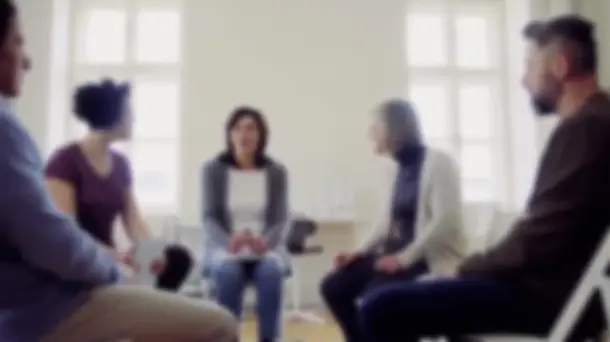Welcome to Narcotics Anonymous
What is our message? The message is that an addict, any addict, can stop using drugs, lose the desire to use, and find a new way to live. Our message is hope and the promise of freedom.

“When new members come to meetings, our sole interest is in their desire for freedom from active addiction and how we can be of help.”
It Works: How and Why, “Third Tradition”
Is NA for me?
This is a question every potential member must answer for themselves. Here are some recommended resources that may be helpful:
Need help for family or a friend?
NA meetings are run by and for addicts. If you're looking for help for a loved one, you can contact Narcotics Anonymous near you.
Subscribe to NAWS Emails
Sign up to receive Just for Today and SPAD daily meditation emails, as well as NAWS News, NAWS Updates, and more.
Never before have so many clean addicts, of their own choice and in free society, been able to meet where they please, to maintain their recovery in complete creative freedom.
Basic Text, “We Do Recover”
Recovery Quicklinks:
Service Quicklinks:
Narcotics Anonymous sprang from the Alcoholics Anonymous Program of the late 1940s, with meetings first emerging in the Los Angeles area of California, USA, in the early Fifties. The NA program started as a small US movement that has grown into one of the world's oldest and largest organizations of its type.
Today, Narcotics Anonymous is well established throughout much of the Americas, Western Europe, Australia, and New Zealand. Newly formed groups and NA communities are now scattered throughout the Indian subcontinent, Africa, East Asia, the Middle East, and Eastern Europe. Narcotics Anonymous books and information pamphlets are currently available in 49 languages.
Information About NA
Daily Meditations
Just for Today
February 15, 2026 |
An awakening of the spirit |
| Page 47 |
| “The last thing we expected was an awakening of the spirit.“ |
| Basic Text, p. 49 |
| Few of us came to our first Narcotics Anonymous meeting aching to take a personal inventory or believing that a spiritual void existed in our souls. We had no inkling that we were about to embark on a journey which would awaken our sleeping spirits. Like a loud alarm clock, the First Step brings us to semi-consciousness–although at this point, we may not be sure whether we want to climb out of bed or maybe sleep for just five more minutes. The gentle hand shaking our shoulders as we apply the Second and Third Steps causes us to stand up, stretch, and yawn. We need to wipe the sleep from our eyes to write the Fourth Step and share our Fifth. But as we work the Sixth, Seventh, Eighth, and Ninth Steps, we begin noticing a spring in our step and the start of a smile on our lips. Our spirits sing in the shower as we take the Tenth and Eleventh Steps. And then we practice the Twelfth, leaving the house in search of others to awaken. We don't have to spend the rest of our lives in a spiritual coma. We may not like to get up in the morning but, once out of bed, we're almost always glad we did. |
| Just for Today: To awaken my sleepy spirit, I will use the Twelve Steps. |
A Spiritual Principle a Day
February 15, 2026 |
Compassion Rather than Judgment |
| Page 47 |
| “When we see someone acting out on a defect that we have acted on ourselves, we feel compassionate rather than judgmental, for we know just exactly how much pain such behavior causes.“ |
| It Works, Step Six |
| We rarely forget the pain of using drugs and the havoc it caused. However, our memories can be a lot shorter about the pain and havoc we've caused ourselves and others by acting out in other ways. Being overly controlling in meetings and overly sensitive at work. Perfectionism. Keeping secrets. Getting in fights. That trifecta of lying-cheating-stealing. Defensiveness! Witnessing such conduct in our fellow recovering addicts–and the pain it causes–often makes us bonkers, but who are we really judging? “You spot it, you got it,” a fellow wryly points out. Oh, right. It's us. Remembering this simple statement about how judging another is frequently rooted in discomfort with our own behavior hopefully will curb our negativity and instead awaken our compassion. Being able to find compassion for others who are acting out on their defects, especially when we have those same flaws, demonstrates considerable growth. This is the intersection between humility and compassion. We know firsthand that such behavior is the result of pain, not just the cause of it. As we develop spiritually, we begin with forgiveness–for ourselves as well as for others–which gives way to empathy. We can then be more loving and accepting. We can be helpful. Whether it's observing an addict on the street doing what addicts do to get another, a member relapsing over and over, or an experienced member stomping out of a business meeting, we can draw on our own experience and find compassion. Our journey of self-discovery deepens when we realize the reciprocity between having compassion for ourselves and receiving the compassion of others and then giving it away. |
| ——— ——— ——— ——— ——— |
| Next time I'm disturbed by another member's actions, I'll look inward. I will choose to show compassion for the still-suffering addict because I was there once too–and will be again. |
Do you need help with a drug problem?
“If you’re new to NA or planning to go to a Narcotics Anonymous meeting for the first time, it might be nice to know a little bit about what happens in our meetings. The information here is meant to give you an understanding of what we do when we come together to share recovery…”
Subscribe to NAWS Emails
Sign up to receive NAWS Updates and NAWS News emails as well as Just for Today and SPAD daily emails.



